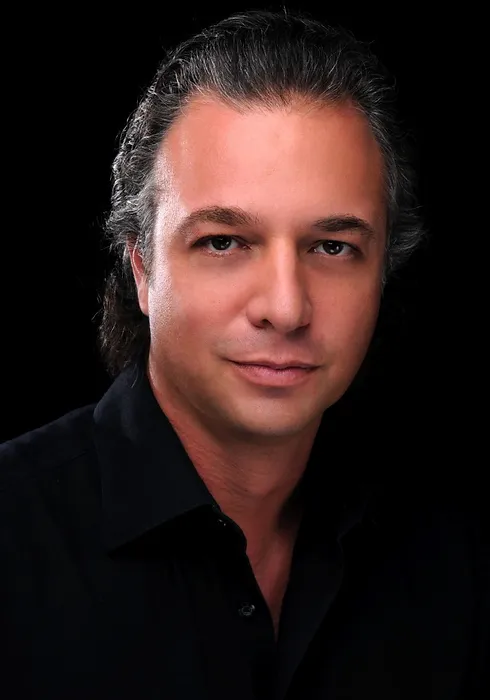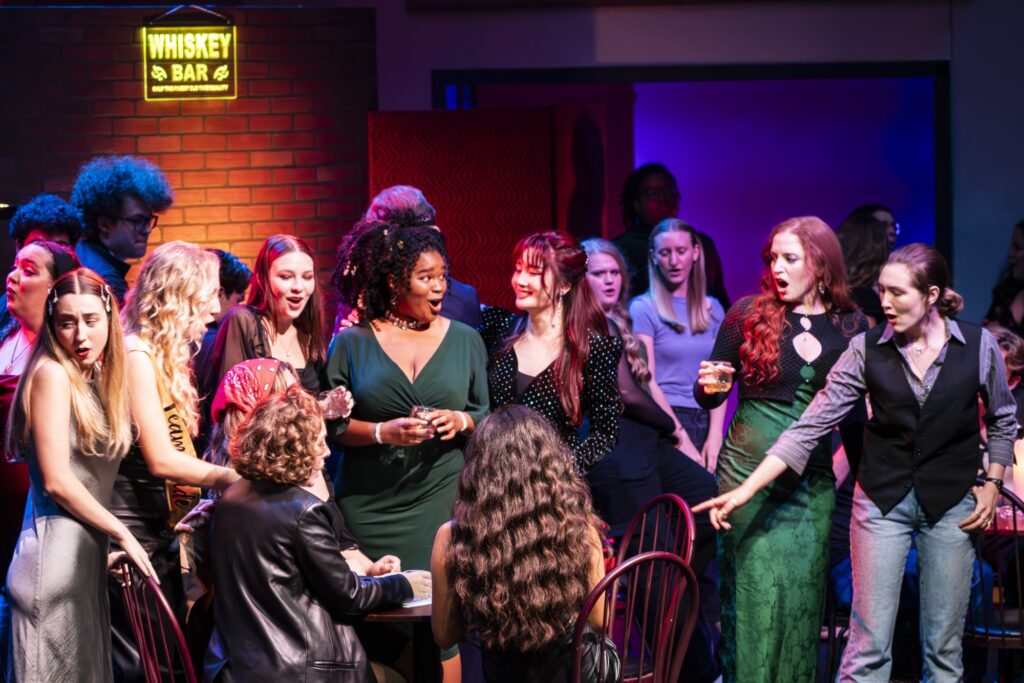Frost Opera Theater’s young singers serve up a lively “Whiskey Bar”mix

Jeffrey Marc Buchman conceived and directed Frost Opera Theater’s “Night in the Next Whiskey Bar,” presented at UM Wednesday night.
As a torrential rainstorm raged outside, the Frost Opera Theater presented “Night in the Next Whiskey Bar,” a musical libation devised by interim opera program director Jeffrey Marc Buchman, Wednesday night at the University of Miami’s Clarke Recital Hall.
Set in a bar populated by a diverse array of patrons, each with their own story and problems, this “modern tapestry” utilized excerpts from the works of wide ranging music theater fare. Music ranged from Baroque composers to Leonard Bernstein, Carlisle Floyd and Rodgers and Hammerstein. The 80-minute presentation was theatrically compelling and tremendously entertaining with Buchman weaving drama and continuity into the disparate characters and musical selections.
Many gifted young voices were displayed in the solos and ensembles that seamlessly drew a picture of life in a place where people came both to celebrate and drown their sorrows. The production’s only misstep was the inclusion of the birth scene from the 1998 opera Flight by British composer Jonathan Dove. A woman giving birth in a bar tends to stretch credibility and the excerpt did not play well out of context.
High spots among the 24 musical selections included a stylish “Prenderó quell brunettino, the Fiordiligi-Dorabella duet, from Mozart’s Cosi fan tutte, stylishly sung and well blended by Angelica Adams and Spencer Bailen. Isobel Breakey and Yingxi Liu displayed a finely idiomatic sense of Baroque vocal grace in “Pur ti miro,” the final duet from Monteverdi’s The Coronation of Poppea.
The production’s title comes from Bertolt Brecht’s lyric for the “Alabama Song” in Kurt Weil’s The Rise and Fall of the City of Mahagonny. Xochiti Hernandez’s burnished soprano and slinky manner perfectly conveyed the opera-cabaret fusion of the Weimar era. More Weil-Brecht found Grace Mineo clearly capturing the cynicism of “Pirate Jenny” from The Threepenny Opera, her diction exceptionally clear. (FOT will produce Weil’s Street Scene in February.)
Italian opera was represented with a soaring rendition by Congcong Wang of “Canzone di Doretta” from Puccini’s La Rondine. Wang’s opulent timbre and free high register make her a natural for the lyric soprano repertoire. Brandon Flores filled in Prunier’s lines in lightish tenor fashion. Impeccable coloratura and musical accuracy embellished Yo-Chun Sarah Tsai’s attractive light mezzo in Isabella’s showpiece “Cruda sorte” from Rossini’s L’Italiana in Algeri.
Hannah Penzner brought appealing stage presence, burnished vocalism and an enchanting manner to the “Silver Aria” from The Ballad of Baby Doe by Douglas Moore, an opera and composer deserving of revival. Zaryah Gourgel sang a dramatic traversal of the mother’s solo “All that Gold” from Gian Carlo Menotti’s Christmas classic Amahl and the Night Visitors.
Cees Postema astutely channeled the villainous sexual desires of the hypocritical preacher Blitch’s aria, “I’m a Lonely Man, Susannah” from Susannah by Carlisle Floyd, even if he overdid the Southern accent. Josie Gore launched into a full-voiced “I Want Magic” from Andre Previn’s A Streetcar Named Desire. As the pregnant Minskwoman, Olivia Gray’s radiant middle register and portrait of emotional turmoil took full wing in “I bought this suitcase in New York” from Dove’s Flight.
Victor Bento displayed a promising countertenor and apt sadness in “Addio, mio ben” from Handel’s Teseo, ably partnered by soprano Rachel Wresh. In a brilliant final tableau, baritone David Lee burned a picture of his beloved in a vibrant rendition of “Pierrots Tanzlied” from Die tote Stadt by Erich Wolfgang Korngold, an opera that has seen revivals in recent years. Then Ashia Barnes appeared, bedecked in a glamorous white gown, to sing “Marietta’s Lied” from the Korngold opera in the now-empty bar. Her large Straussian soprano impressively scaled the aria’s final echoes of full-blown romanticism.
Two big ensembles added pizzazz to the evening. Holden Seward led a six man contingent in a rousing “Girls, girls, girls” from Lehar’s The Merry Widow and they encored a chorus. A brief pipe dream of a heist among the bar patrons engendered an invigorating and splendidly sung smuggler’s ensemble “Quant au douanier” from Bizet’s Carmen with a large chorus joining the 5 solo singers.
Rina Kharrasova and Shuguang Gong took turns at the onstage keyboard. Both were outstanding accompanists who matched the singers’ shaping of phrases and lines while bringing forth each composer’s compositional footprint. Diego Mattallana’s lighting added atmosphere to the stage settings, with smoke sometimes billowing around the bar.
There is one remaining performance of this varied, well-conceived operatic potpourri.
“Night in the Next Whiskey Bar” will be repeated 7:30 p.m. Thursday at the UM Clarke Recital Hall in Coral Gables. Tickets are free but must be reserved. music.miami.edu
Posted in Performances
One Response to “Frost Opera Theater’s young singers serve up a lively “Whiskey Bar”mix”
Leave a Comment
Thu Nov 16, 2023
at 12:40 pm
1 Comment







Posted Nov 16, 2023 at 3:00 pm by Jack Firestone
Great job at capturing the essence of the evening as well as the details of the fine singing. Kudos to Jeffrey Buchman whose inspired architecture and direction on which the production was built. It is the perfect showcase for the young singers at the Frost Opera Theater.
Frost Opera continues to produce imaginative, creative, and worthy work. More of the community should take advantage and enjoy these efforts. Bravi Tutti.